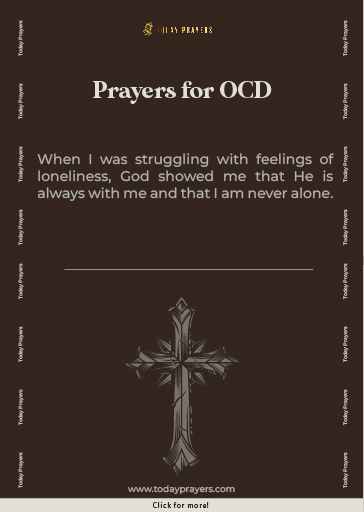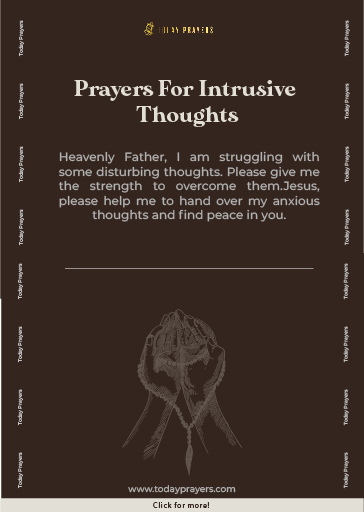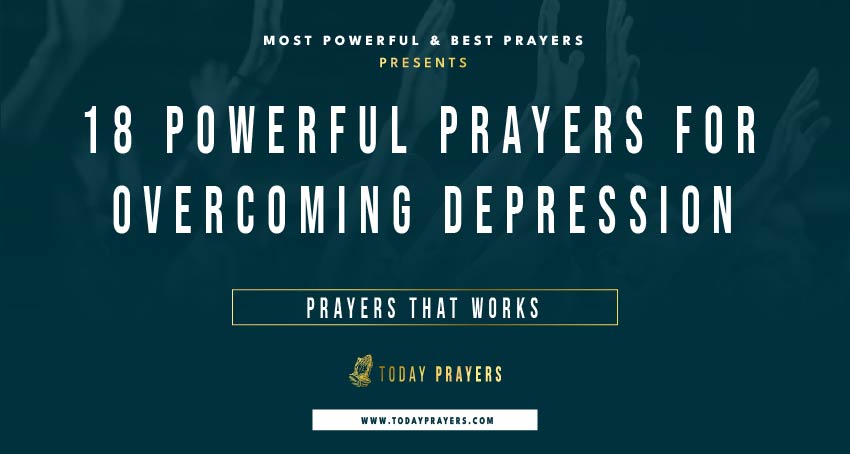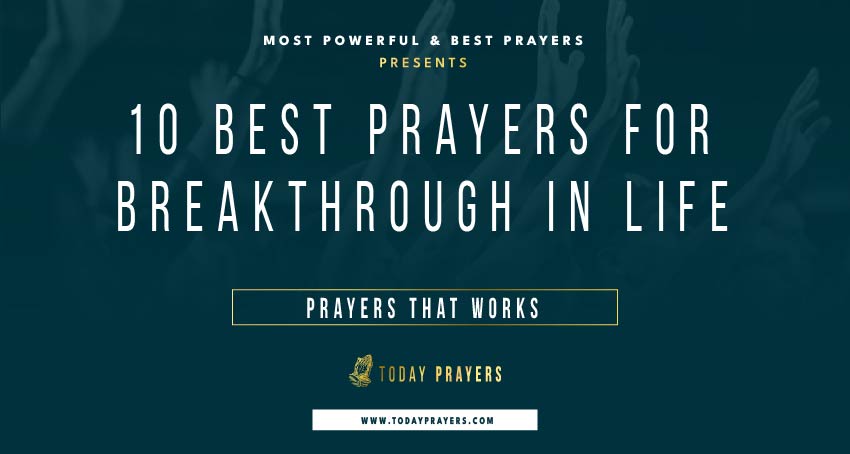Obsessive Compulsive Disorder (OCD) is a mental health condition characterized by intrusive repetitive thoughts and compulsive behaviors that can negatively impact a person’s daily life. These symptoms can range from frustrating to debilitating, making it difficult for individuals to live their lives the way they would like to. Fortunately, there are Prayers for OCD and resources available that can help individuals with OCD deal with the symptoms of this disorder.
Prayer is a powerful tool that can provide comfort and strength to people struggling with OCD. It can be an essential part of a comprehensive treatment plan that includes medication, therapy, and self-care. This blog post will explore 25 good and strong prayers for OCD that can help individuals with OCD feel more at peace and empowered. Whether you practice a particular religion or spirituality or not, prayer can be a powerful way of connecting with something greater than yourself and tapping into the power of the universe to support your mental and emotional well-being.
This blog post will provide a comprehensive list of prayers that can support individuals with OCD in coping with their symptoms. We will examine prayers from different faith traditions to offer a wide range of options. Each prayer will be accompanied by a brief explanation of its significance and how it can help individuals struggling with OCD.
5 Things to Do Before Prayers for OCD
Many people who suffer from OCD feel immense pressure to complete their rituals perfectly. This can often result in excessive pre-prayer anxiety and leaving prayers until the last minute. If you want to reduce your OCD symptoms and improve your quality of life, here are 5 things to do before prayers:
- Relax your body. Take a few deep breaths and loosen any tight muscles. This will help to reduce the physical tension you’re feeling and make it easier to focus on your prayers.
- Quiet your mind. Obsessive thoughts can be very loud and distracting. Take a few minutes to meditate or do some deep breathing exercises to help quiet your mind before starting your prayers.
- Picture yourself succeeding. Visualize yourself calmly and confidently completing your prayers without any mistakes. This will help to increase your confidence and decrease your anxiety.
- Set a reasonable goal. Don’t try to perfect your prayers ordo them perfectly in one sitting. Instead, focus on completing them without any major mistakes. Set a goal that is realistic and achievable for you.
- Give yourself some grace. Prayer is supposed to be a peaceful and calming activity, not something that causes you stress and anxiety. If you make a mistake or feel like you’re not doing as well as you’d like, give yourself some grace and remember that nobody is perfect.

God Healed My Intrusive Thoughts
God healed my intrusive thoughts when I surrendered them to Him. As soon as I did, He took away the anxiety and fear that came with them. I now live in freedom from those thoughts! Here are five examples of how God has healed my intrusive thoughts:
Sample 1:
When I was constantly worrying about what others thought of me, God showed me that my worth comes from Him and not from other people's opinions.
Sample 2:
When I was obsessing over my physical appearance, God showed me that He made me perfectly and that I am beautiful in His eyes.
Samples 3:
When I was consumed with worries about the future, God showed me that He is in control and that He has a plan for my life.
Sample 4:
When I was struggling with feelings of loneliness, God showed me that He is always with me and that I am never alone.
Sample 5:
When I was doubting my faith, God showed me His faithfulness and His love for me. God has healed my intrusive thoughts because He loves me and He wants what is best for me. When we surrender our fears and our worries to Him, He gives us peace and freedom in return. So if you are struggling with intrusive thoughts, know that there is hope! Turn to God and let Him heal your mind and your heart.
Prayers For Intrusive Thoughts
There are many different ways to deal with intrusive thoughts. One is to simply acknowledge them and let them go. This can be easier said than done, but it is a helpful way to remind yourself that the thoughts are not real. Another way to deal with intrusive thoughts is to pray. Prayer can help to calm and focus your mind, which can make the thoughts less persistent and more manageable. Here are five examples of prayers for intrusive thoughts:
Samples 1:
Dear God, please help me to quiet my mind and focus on your love.
Sample 2:
Heavenly Father, I am struggling with some disturbing thoughts. Please give me the strength to overcome them.
Sample 3:
Lord, I know that these thoughts are not from you. Please help me to push them away and focus on your truth.
Samples 4:
Jesus, please help me to hand over my anxious thoughts and find peace in you.
Sample 5:
Holy Spirit, please fill me with your peace and help me to silence the negative voice in my head.

Prayer For Obsessive Thoughts
Sample 1:
"Dear God, please help me to break free from my obsessive thoughts. I know that they are not healthy for me, and I am tired of being controlled by them. please give me the strength and insight to overcome this obstacle in my life."
Samples 2:
"Heavenly Father, I come to you today confessing that I am struggling with obsessive thoughts. I know that these thoughts are not from you, and I want to be free from them. please give me the courage and wisdom to dismantle them, so that I can live in your freedom."
Sample 3:
"Lord Jesus, I need your help with my obsessive thoughts. They are so overpowering and consuming, and I feel like they are taking over my life. please give me your strength and peace to deal with them, so that I can focus on living for you."
Samples 4:
"Almighty God, I come to you broken-hearted over my obsessive thoughts. These thoughts are strongholds in my life, and I want to be free from them. Please set me free from their grasp, and help me to live in your peace."
Samples 5:
"Father God, I Need Your Help To Overcome My Obsessive Thoughts. These Thoughts Are Not From You, And They Are Not Healthy For Me. Please Give Me The Strength And Wisdom To Dismantle Them So That I Can Live In Your Freedom."
5 Benefits of Prayers for OCD
For people with OCD, the constant cycle of intrusive thoughts and compulsions can be exhausting. However, many people find that prayer can be a helpful tool in managing their OCD symptoms. Here are five benefits of praying for OCD:
- Prayer can help to calm the mind and provide a sense of peace.
- Praying can help to distract from intrusive thoughts and offer a sense of focus.
- Praying can help to build up resistance to compulsive behaviors.
- Prayer can provide support and encouragement from others.
- Praying can help to strengthen one’s faith and provide a sense of hope.

Conclusion
In conclusion, the power of prayer transcends beyond what we can fathom. It is a tool that we can use to transform our thought processes, emotions, and even the decisions we make. OCD is a mental health condition that can be extremely overwhelming and can interfere with daily life. However, incorporating prayer into one’s daily routine can help to alleviate some of the symptoms associated with OCD. The 25 good and strong prayers for OCD provide an incredible resource for readers to connect with their spirituality and find comfort in their faith.
Finally, we appreciate your feedback on this blog post. Kindly share your thoughts, comments, and personal experiences with OCD and how these prayers have helped you. We also encourage you to visit our website for more insights and ideas to help you on your journey toward mental wellness. Remember, you are not alone. The journey toward managing OCD is a gradual one that requires patience, persistence, and a willingness to seek help when necessary.








Leave a Comment